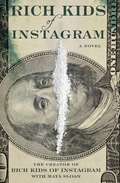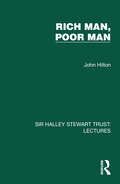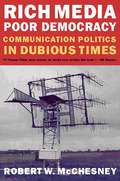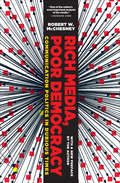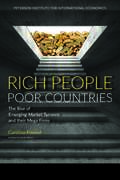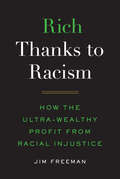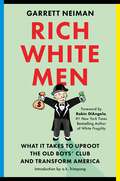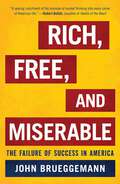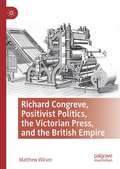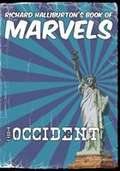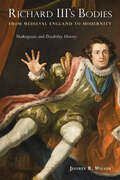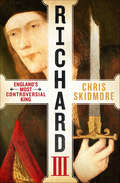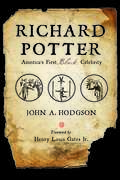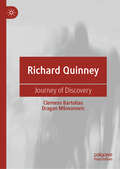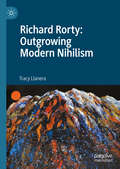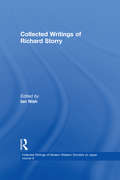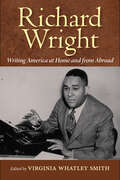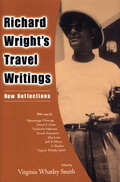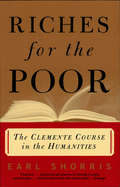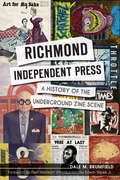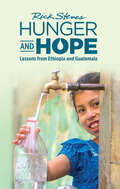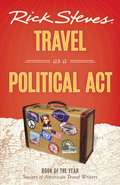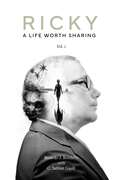- Table View
- List View
Rich Kids of Instagram
by By The Creator Of Rich Kids Of InstagramBased on the wildly popular blog “Rich Kids of Instagram,” a dishy and hilarious novel about the intersecting lives of the world’s most extravagant, unapologetically uber-rich teenagers.The “Rich Kids of Instagram” are not your typical well-to-do brats. These “kids” drive Ferraris, fly to their weekend getaways in private jets, and post self-indulgent photos of themselves online as frequently—and as wantonly—as they blow wads of cash. Not to mention that they’re more involved in sex, drugs, and power plays than most people twice their age.Drawing from the ten most frequent contributors to the popular blog of the same name—which receives an average of 850,000 unique visitors a month and has been featured on 20/20, The New York Times, The Washington Post, Forbes, The Atlantic, Buzzfeed, Gawker, and others—Rich Kids of Instagram revolves around a core group of spoiled young people, from a Southern Belle poultry-empire heiress to a media mogul’s driven daughter and an old-money rifle heir with a Mayflower legacy; to a nouveau riche outsider who is thrust into the members-only universe of the .1%, with scandalous results.In a world that is smaller, more connected, and more competitive than ever, where nothing is off limits, some kids are just trying to make a buck—or ten thousand. Prepare to be wowed by this saucy, compulsively readable book about the hilarious display of extravagant wealth and the teenagers who have fallen into it.
Rich Man, Poor Man (Sir Halley Stewart Trust: Lectures)
by John HiltonFirst published in 1944 (Sir Halley Stewart Lectures 1938), the original blurb reads: “In Rich Man, Poor Man, Professor John Hilton examines the facts as to the distribution of wealth in this country. He finds that of our twelve million families only four million (a few of them immensely rich) are worth all told more than £100; four million are worth between a couple of pounds and a hundred; and four million live from hand to mouth, owning no more than they stand up in and sit down at – if that. But what about the £3, 000,000,000 of “Small Savings”? Professor Hilton answers. How comes it about that so few own so much of the wealth of the country, and so many own so little? Why are the poor poor and the rich rich? Is it because the poor are a poor sort and the rich are a rich sort? If not – what? The book tells of a special study of three hundred poor families.As for those of us in the middle range, whose real incomes have been steadily rising, what do we do with the extra? We spend some of it wisely. Professor Hilton goes on to examine various aspects of our spending, such as what we spend on pints, perms, poms, pictures and pools; and why: the curious and costly practice of burning fermented leaf-mold under the nose: twiddlers of fruit-machines and pin-tables: followers of dogs and horses: users of turnstiles and totalisators: knaves and thieves on the doorstep and in the letterbox: the £3, 000,000,000 of recent surplus we haven’t saved, and what would have happened if we had. “It’s the rich wot ‘elps the rich.” What it all means in terms of national well-being and strength, and what to do about it.”. Today it can be read and enjoyed in its historical context.This book is a re-issue originally published in 1944. The language used and views portrayed are a reflection of its era and no offence is meant by the Publishers to any reader by this re-publication.
Rich Media, Poor Democracy: Communication Politics in Dubious Times
by Robert W. McchesneyIn this myth-breaking book, McChesney argues that the media, far from providing a bedrock for freedom and democracy, have become a significant anti-democratic force in the United States and, to varying degrees, worldwide.
Rich Media, Poor Democracy: Communication Politics in Dubious Times (The\history Of Communication Ser.)
by Robert W. McChesneyAn updated edition of the &“penetrating study&” examining how the current state of mass media puts our democracy at risk (Noam Chomsky). What happens when a few conglomerates dominate all major aspects of mass media, from newspapers and magazines to radio and broadcast television? After all the hype about the democratizing power of the internet, is this new technology living up to its promise? Since the publication of this prescient work, which won Harvard&’s Goldsmith Book Prize and the Kappa Tau Alpha Research Award, the concentration of media power and the resultant &“hypercommercialization of media&” has only intensified. Robert McChesney lays out his vision for what a truly democratic society might look like, offering compelling suggestions for how the media can be reformed as part of a broader program of democratic renewal. Rich Media, Poor Democracy remains as vital and insightful as ever and continues to serve as an important resource for researchers, students, and anyone who has a stake in the transformation of our digital commons. This new edition includes a major new preface by McChesney, where he offers both a history of the transformation in media since the book first appeared; a sweeping account of the organized efforts to reform the media system; and the ongoing threats to our democracy as journalism has continued its sharp decline. &“Those who want to know about the relationship of media and democracy must read this book.&” —Neil Postman &“If Thomas Paine were around, he would have written this book.&” —Bill Moyers
Rich People Poor Countries: The Rise of Emerging-Market Tycoons and Their Mega Firms
by Caroline FreundLike the robber barons of the 19th century Gilded Age, a new and proliferating crop of billionaires is driving rapid development and industrialization in poor countries. The accelerated industrial growth spurs economic prosperity for some, but it also widens the gap between the super rich and the rest of the population, especially the very poor.In Rich People Poor Countries, Caroline Freund identifies and analyzes nearly 700 emerging-market billionaires whose net worth adds up to more than $2 trillion. Freund finds that these titans of industry are propelling poor countries out of their small-scale production and agricultural past and into a future of multinational industry and service-based mega firms. And more often than not, the new billionaires are using their newfound acumen to navigate the globalized economy, without necessarily relying on political connections, inheritance, or privileged access to resources. This story of emerging-market billionaires and the global businesses they create dramatically illuminates the process of industrialization in the modern world economy.
Rich Relations: The American Occupation of Britain, 1942-1945
by David ReynoldsThe fascinating social and political history of a time when a million and a half American servicemen crowded onto a small island, training and waiting for a conflict which would eventually cost many of them their lives. "A superb job of telling one of the most fascinating stories of World War II. "--Stephen E. Ambrose. 16 pages of photos, maps, charts, and political cartoons. Index.
Rich Thanks to Racism: How the Ultra-Wealthy Profit from Racial Injustice
by Jim FreemanMore than fifty years after the civil rights movement, there are still glaring racial inequities all across the United States. In Rich Thanks to Racism, Jim Freeman, one of the country's leading civil rights lawyers, explains why as he reveals the hidden strategy behind systemic racism. He details how the driving force behind the public policies that continue to devastate communities of color across the United States is a small group of ultra-wealthy individuals who profit mightily from racial inequality.In this groundbreaking examination of "strategic racism," Freeman carefully dissects the cruel and deeply harmful policies within the education, criminal justice, and immigration systems to discover their origins and why they persist. He uncovers billions of dollars in aligned investments by Bill Gates, Charles Koch, Mark Zuckerberg, and a handful of other billionaires that are dismantling public school systems across the United States. He exposes how the greed of prominent US corporations and Wall Street banks was instrumental in creating the world's largest prison population and our most extreme anti-immigrant policies. Freeman also demonstrates how these "racism profiteers" prevent flagrant injustices from being addressed by pitting white communities against communities of color, obscuring the fact that the struggles faced by white people are deeply connected with those faced by people of color.Rich Thanks to Racism is an invaluable road map for all those who recognize that the key to unlocking the United States' full potential is for more people of all races and ethnicities to prioritize racial justice.
Rich White Men: What It Takes to Uproot the Old Boys' Club and Transform America
by Garrett NeimanWith a foreword by New York Times bestselling author Robin DiAngelo, this provocative book investigates major corporate boardrooms and presents a data-driven analysis of how rich white men have preserved their monopoly on power—and what we can do to stop them. It&’s no secret that our country has a serious problem when it comes to wealth inequality – and systemic racism and patriarchy have only exacerbated the advantages of wealthy white men. Over the past three decades, America&’s richest white men have only become richer, while those suffering in poverty have only gotten poorer. The divide may seem too great to bridge, but Rich White Men exposes the hidden and insidious ways that white male elites inherit, increase, and preserve their status—and, in this book, we get clear on how to uproot their monopoly on power. Serial nonprofit entrepreneur Garrett Neiman&’s day job is to get rich white men to donate money to good causes and organizations. In Rich White Men, Neiman brings us into corner offices of billionaires and the boardrooms of Goldman Sachs, McKinsey, Stanford, Harvard, and other enclaves of silver-spooned white men to illuminate the role of rich white men in the world and how they justify inequality. He uses the analogy of compound interest to illustrate how the advantages wealthy white men inherit give them a leg up at key moments in their lives, gilding their trajectories and shutting others out. Through this rare, insider access, readers will discover new ways to persuade the elite toward progressive solutions. A hopeful polemic, the book sheds light on dark truths about inequality and the people invested in preserving it while also providing a blueprint for how America can become an equitable democracy.Rich White Men reveals that to realize America&’s founding aspiration of life, liberty, and the pursuit of happiness, we must recognize, dismantle, and transform our current system into one that liberates us all – including this nation&’s morally and spiritually impoverished wealthy white men.
Rich, Free, and Miserable: The Failure of Success in America
by John BrueggemannCompared to much of the rest of the world, America and its citizens are rich. But many people are also deeply miserable—at work, at home, or both. In this provocative book, author John Brueggemann unpacks why so many people are struggling, both emotionally and financially, in a nation that looks so prosperous on the surface. From a hospital patient reduced to a balance sheet to a parent working such long hours that he misses dinner, Brueggemann argues that market thinking has permeated every corner of our lives. In the pursuit of more and better, relationships erode, to the detriment of individuals, communities, and the nation as a whole. Rich, Free, and Miserable not only outlines these pressing social problems, but also offers practical suggestions for people looking to make a positive change.
Richard Congreve, Positivist Politics, the Victorian Press, and the British Empire
by Matthew WilsonThis book is about the life and times of Richard Congreve. This polemicist was the first thinker to gain instant infamy for publishing cogent critiques of imperialism in Victorian Britain. As the foremost British acolyte of Auguste Comte, Congreve sought to employ the philosopher’s new science of sociology to dismantle the British Empire. With an aim to realise in its place Comte’s global vision of utopian socialist republican city-states, the former Oxford don and ex-Anglican minister launched his Church of Humanity in 1859. Over the next forty years, Congreve engaged in some of the most pressing foreign and domestic controversies of his day, despite facing fierce personal attacks in the Victorian press. Congreve made overlooked contributions to the history of science, political economy, and secular ethics. In this book Matthew Wilson argues that Congreve’s polemics, ‘in the name of Humanity’, served as the devotional practices of his Positivist church.
Richard Halliburton's Book Of Marvels: The Occident
by Richard HalliburtonWritten for students but loved by all ages Marvels of the Occident takes you on a journey to some of the marvels of our world. Visit wonders both natural and man-made, places you've heard about, and others you won't believe you didn't know of before.
Richard III's Bodies from Medieval England to Modernity: Shakespeare and Disability History
by Jeffrey R. WilsonRichard III will always be central to English disability history as both man and myth—a disabled medieval king made into a monster by his nation’s most important artist. In Richard III’s Bodies from Medieval England to Modernity, Jeffrey Wilson tracks disability over 500 years, from Richard’s own manuscripts, early Tudor propaganda, and x-rays of sixteenth-century paintings through Shakespeare’s soliloquies, into Samuel Johnson’s editorial notes, the first play produced by an African American Theater company, Freudian psychoanalysis, and the rise of disability theater. For Wilson, the changing meanings of disability created through shifting perspectives in Shakespeare’s plays prefigure a series of modern attempts to understand Richard’s body in different disciplinary contexts—from history and philosophy to sociology and medicine. While theorizing a role for Shakespeare in the field of disability history, Wilson reveals how Richard III has become an index for some of modernity’s central concerns—the tension between appearance and reality, the conflict between individual will and external forces of nature and culture, the possibility of upward social mobility, and social interaction between self and other, including questions of discrimination, prejudice, hatred, oppression, power, and justice.
Richard III: England's Most Controversial King
by Chris Skidmore“A bold and fresh new biography of one of the most enduringly fascinating monarchs . . . steeped in the latest research and majestically narrated.” —Dan Jones, award-winning historian and New York Times–bestselling author of The PlantagenetsFrom acclaimed historian Chris Skidmore comes the authoritative biography of Richard III, England’s most controversial king, a man alternately praised as a saint and cursed as a villain.Richard III is one of English history’s best known and least understood monarchs. Immortalized by Shakespeare as a hunchbacked murderer, the discovery in 2012 of his skeleton in a Leicester parking lot re-ignited debate over the true character of England’s most controversial king.Richard was born into an age of brutality, when civil war gripped the land and the Yorkist dynasty clung to the crown with their fingertips. Was he really a power-crazed monster who killed his nephews, or the victim of the first political smear campaign conducted by the Tudors?In the first full biography of Richard III for fifty years, Chris Skidmore draws on new manuscript evidence to reassess Richard’s life and times.Richard III examines in intense detail Richard’s inner nature and his complex relations with those around him to unravel the mystery of the last English monarch to die on the battlefield.“This highly readable chronicle comprises vaulting ambition, familial betrayal, moral corruption, high politics, foul murder and a beautiful queen lusting for revenge.” —Wall Street Journal“[Skidmore's] biography bids fair to become the definitive account for the 21st century.” —Washington Independent Review of Books“A gripping, vivid, fresh portrait of Richard III.” —Simon Sebag Montefiore“A portrait that chills you to the bone.” —The Times of London
Richard Potter: America's First Black Celebrity
by John A. HodgsonApart from a handful of exotic--and almost completely unreliable--tales surrounding his life, Richard Potter is almost unknown today. Two hundred years ago, however, he was the most popular entertainer in America--the first showman, in fact, to win truly nationwide fame. Working as a magician and ventriloquist, he personified for an entire generation what a popular performer was and made an invaluable contribution to establishing popular entertainment as a major part of American life. His story is all the more remarkable in that Richard Potter was also a black man. This was an era when few African Americans became highly successful, much less famous. As the son of a slave, Potter was fortunate to have opportunities at all. At home in Boston, he was widely recognized as black, but elsewhere in America audiences entertained themselves with romantic speculations about his "Hindu" ancestry (a perception encouraged by his act and costumes). Richard Potter’s performances were enjoyed by an enormous public, but his life off stage has always remained hidden and unknown. Now, for the first time, John A. Hodgson tells the remarkable, compelling--and ultimately heartbreaking--story of Potter’s life, a tale of professional success and celebrity counterbalanced by racial vulnerability in an increasingly hostile world. It is a story of race relations, too, and of remarkable, highly influential black gentlemanliness and respectability: as the unsung precursor of Frederick Douglass, Richard Potter demonstrated to an entire generation of Americans that a black man, no less than a white man, could exemplify the best qualities of humanity. The apparently trivial "popular entertainment" status of his work has long blinded historians to his significance and even to his presence. Now at last we can recognize him as a seminal figure in American history.
Richard Quinney: Journey of Discovery (Palgrave Pioneers in Criminology)
by Clemens Bartollas Dragan MilovanovicThis book traces the life course of Richard Quinney, one of the most cited authors in the social sciences and a key figure in the development of critical criminology in the 70s, 80s and 90s. It provides a look into his personal thoughts in becoming a 'radical' criminologist and situates it in his various experiences, questioning, and shifts in his journey through life. Richard has contributed to a profound paradigm shift in criminology, beginning with his book, The Social Reality of Crime (1970), but also to peacemaking criminology as well as peace studies. He has also written several books via an autoethnography approach and has presented a number of photograph presentations for which he has received awards. It traces his early development on the family farm in Wisconsin to his travels in higher academe. It gives a personal perspective in becoming not only a radical criminologist, an accomplished writer in auto-ethnography, visual sociology, and photography but also how his continuous questioning of the meaning of it all came to fruition with profound insights about what it is to be human. The book will be inspirational to not only seasoned veterans in criminology, but also to emerging scholars, to undergrads and grads, showing them the struggles that come in 'making it'.
Richard Rorty: Outgrowing Modern Nihilism
by Tracy LlaneraThe book makes a new contribution to the contemporary debates on nihilism and the sacred. Drawing on an original interpretation of Richard Rorty’s writings, it challenges the orthodox treatment of nihilism as a malaise that human beings must overcome. Instead, nihilism should be framed as a problem for human culture to outgrow through pragmatism.
Richard Storry - Collected Writings (Collected Writings of Modern Western Scholars on Japan #Vol. 9)
by Richard StorryThis volume of the Collected Writings of Modern Western Scholars on Japan series, published under the Japan Library imprint, collects the work of Richard Storry on contempory issues and the history of Japan.
Richard Wright Writing America at Home and from Abroad: New Reflections
by Virginia Whatley SmithContributions by Robert J. Butler, Ginevra Geraci, Yoshinobu Hakutani, Floyd W. Hayes III, Joseph Keith, Toru Kiuchi, John Lowe, Sachi Nakachi, Virginia Whatley Smith, and John Zheng Critics in this volume reassess the prescient nature of Richard Wright's mind as well as his life and body of writings, especially those directly concerned with America and its racial dynamics. This edited collection offers new readings and understandings of the particular America that became Wright's focus at the beginning of his career and was still prominent in his mind at the end. Virginia Whatley Smith's edited collection examines Wright's fixation with America at home and from abroad: his oppression by, rejection of, conflict with, revolts against, and flight from America. Other people have written on Wright's revolutionary heroes, his difficulties with the FBI, and his works as a postcolonial provocateur; but none have focused singly on his treatment of America. Wherever Wright traveled, he always positioned himself as an African American as he compared his experiences to those at hand. However, as his domestic settlements changed to international residences, Wright's craftsmanship changed as well. To convey his cultural message, Wright created characters, themes, and plots that would expose arbitrary and whimsical American policies, oppressive rules which would invariably ensnare Wright's protagonists and sink them more deeply into the quagmire of racial subjugation as they grasped for a fleeting moment of freedom. Smith's collection brings to the fore new ways of looking at Wright, particularly his post-Native Son international writings. Indeed, no critical interrogations have considered the full significance of Wright's masterful crime fictions. In addition, the author's haiku poetry complements the fictional pieces addressed here, reflecting Wright's attitude toward America as he, near the end of his life, searched for nirvana—his antidote to American racism.
Richard Wright's Travel Writings: New Reflections
by Virginia Whatley SmithAttracted to remote lands by his interest in the postcolonial struggle, Richard Wright (1908-1960) became one of the few African Americans of his time to engage in travel writing. He went to emerging nations not as a sightseer but as a student of their cultures, learning the politics and the processes of social transformation. When Wright fled from the United States in 1946 to live as an expatriate in Paris, he was exposed to intellectual thoughts and challenges that transcended his social and political education in America. Three events broadened his world view—his introduction to French existentialism, the rise of the Pan-Africanist movement to decolonize Africa, and Indonesia's declaration of independence from colonial rule in 1945. During the 1950s as he traveled to emerging nations, his encounters produced four travel narratives—Black Power (1953), The Color Curtain (1956), Pagan Spain (1956), and White Man, Listen! (1957). Upon his death in 1960, he left behind an unfinished book on French West Africa, which exists only in notes, outlines, and a draft. Written by multinational scholars, this collection of essays exploring Wright's travel writings shows how in his hands the genre of travel writing resisted, adapted, or modified the forms and formats practiced by white authors. Enhanced by nine photographs taken by Wright during his travels, the essays focus on each of Wright's four separate narratives as well as upon his unfinished book and reveal how Wright drew on such non-Western influences as the African American slave narrative and Asian literature of protest and resistance. The essays critique Wright's representation of customs and people and employ a broad range of interpretive modes, including the theories of formalism, feminism, and postmodernism, among others. Wright's travel books are proven to be innovative narratives that laid down the roots of such later genres as postcolonial literature, contemporary travel writing, and resistance literature.
Riches for the Poor: The Clemente Course in the Humanities
by Earl Shorris"You've been cheated," Earl Shorris tells a classroom of poor people in New York City. "Rich people learn the humanities; you didn't. . . . It is generally accepted in America that the liberal arts and humanities in particular belong to the elite. I think you're the elite." In this groundbreaking work, Shorris examines the nature of poverty in America today. Why are people poor, and why do they stay poor? Shorris argues that they lack politics, or the ability to participate fully in the public world; knowing only the immediacy and oppression of force, the poor remain trapped and isolated. To test his theory, Shorris creates an experimental school teaching the humanities to poor people, giving them the means to reflect and negotiate rather than react. The results are nothing short of astonishing. Originally published in hardcover under the title New American Blues.
Richmond Independent Press: A History of the Underground Zine Scene
by Dale M BrumfieldAn acclaimed local author recounts the evolution of Richmond&’s alternative newspapers, comics, and small presses beginning in the Civil Rights Era. As the political and social upheaval of the 1960s took hold across the United States, even the sleepy town of Richmond, Virginia, experienced a countercultural shift. New attitudes about the value of journalism spurred an underground movement in the press. &“The Sunflower,&” Richmond&’s first underground newspaper, appeared in 1967 and set the stage for a host of alternative local media lasting into the 1990s and beyond. Publications such as the &“Richmond Chronicle,&” &“Richmond Mercury,&” and &“Commonwealth Times,&” as well as numerous minority-focused presses such as &“Richmond Afro-American,&” served the progressive-minded citizens of the River City. In Richmond Independent Press, the historian, activist and former &“ThroTTle&” editor Dale Brumfield reveals the untold story of this cultural revolution in the River City.</
Rick Steves Hunger and Hope
by Rick StevesIn his one-hour public television special, Rick Steves' Hunger and Hope, travel expert Rick Steves ventures beyond Europe to learn about the key realities of extreme poverty. Inside this companion e-book, you'll uncover Rick's firsthand insights on:How ending world hunger in our lifetime is an attainable goal The importance of water access, education, women's empowerment, and financial literacy in creating long-term independence How communities are using smart development to rise out of povertyJoin Rick Steves in Ethiopia and Guatemala and discover how you can make a difference.
Rick Steves Travel as a Political Act
by Rick StevesTravel connects people with people. It helps us fit more comfortably and compatibly into a shrinking world, and it inspires creative new solutions to persistent problems facing our nation. We can't understand our world without experiencing it. Rick Steves Travel as a Political Act helps us take that first step.There's more to travel than good-value hotels, great art, and tasty cuisine. Americans who "travel as a political act" can have the time of their lives and come home smarter-with a better understanding of the interconnectedness of today's world and just how our nation fits in.In the second edition of this award-winning book, acclaimed travel writer Rick Steves explains how to travel more thoughtfully-to any destination. With updated information on Europe, Central America, and Asia; an expanded discussion of the Middle East; and a brand-new chapter on the Holy Land that covers Israelis and Palestinians today, Rick shows readers how his travels have shaped his politics and broadened his perspective.The royalties from the sale of this edition will be donated by Rick Steves to Bread for the World, a Christian organization working to end hunger around the world.
Ricky: A Life Worth Sharing, Volume I
by Ricardo J. Bordallo C. Sablan GaultBefore he was a businessman, senator, and governor, Ricardo J. Bordallo was simply “Ricky,” a young CHamoru man from Guam, the island he loved. The first volume of a two-part series, Ricky: A Life Worth Sharing is Bordallo’s account of his early life, as told to his cousin C. Sablan Gault. From an idyllic village childhood to the horrors of the occupation during WWII and the shifting cultural and political landscape of an island transformed in the aftermath of war, Ricky explores the formative experiences of one of Guam’s most well-known public figures.

